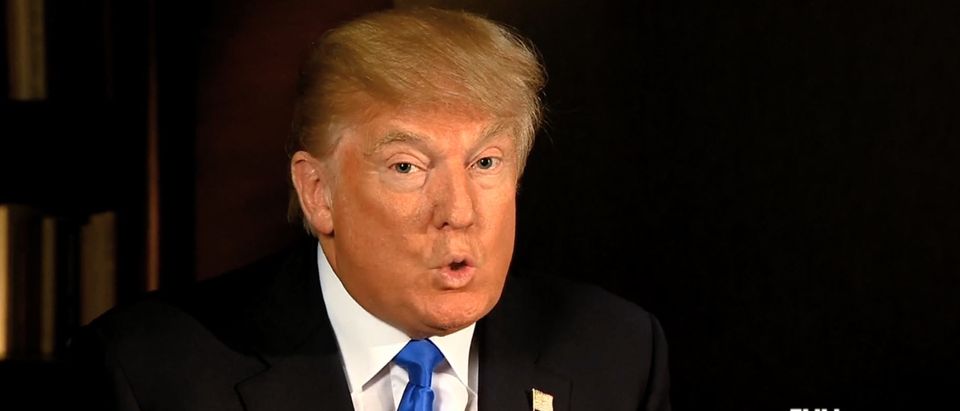Americans ought to welcome Donald Trump’s willingness to assess critically the many time-sanctioned sacred cows and clichés with which U.S. foreign policy abounds, and to determine anew which, if any, no longer serve our national interests and are even perhaps leading us in the wrong direction. This process, I suggest, is akin to “zero-based budgeting” in fiscal matters, i.e., reevaluating every old line item from point zero – and is a good thing.
The hysterical diatribe in the media against Mr. Trump by self-described “national security leaders” reflecting establishment views is overreactive and misses the point. They appear to fear that a President Trump would conduct a searching reappraisal of U.S. foreign policy that should have occurred after the fall of the Berlin Wall, but never did.
Mr. Trump is right to call for a fresh look at America’s relationships in terms of costs and returns, especially with respect to NATO. In 1949, Senator Robert Taft voted for ratification of the NATO treaty on the condition that the U.S. withdraw from it the moment Europe was sufficiently recovered from World War II to afford its own defense. Taft’s rival, Dwight D. Eisenhower, concurred, saying that, if, by 1961, U.S. forces in Europe had not come home, the NATO experiment would have failed. These two giants of mid-century Republican politics were united in their opposition to NATO’s becoming a permanent, costly commitment. Mr. Trump’s call for reassessing our enormously expensive one-way guarantees to South Korea and Japan is likewise long overdue. Both are very wealthy countries, as are Germany, Britain and most other NATO nations.
Mr. Trump believes that improving relations with Russia could be in America’s national interest. Calls by his competitors and media critics to relentlessly provoke and confront Moscow are ill-considered and imprudent. Russia straddles the crossroads of Eurasia and is immensely rich in natural resources. It is the only country that has the nuclear capability to inflict mortal damage on the United States. As demonstrated in Syria, Moscow has forcefully returned to the geostrategic stage and can, as a Christian nation, either become a valued partner in defeating a resurgent Radical Islam or, alternatively, a possibly dangerous foe. Mr. Trump has said he would strive to get along with Mr. Putin despite his admitted imperfections. Ronald Reagan, whose name Mr. Trump’s rivals love to invoke, would sympathize with this approach, I believe. Mr. Trump also asks that, if Russia is a problem for Europe, why then isn’t Europe taking the lead? Germany, in particular, seems to be “silent,” as Mr. Trump points out.
Mr. Trump has decried the trillions of taxpayer dollars wasted in wars of choice, notably in Iraq and Libya. He has rightly decried the “madness” of seeking to oust the secular Assad government in Syria (yet another “regime change”?!) while simultaneously confronting the Radical Islamic State. (All three of these debacles – Iraq, Libya, and Syria – have Hillary Clinton’s fingerprints all over them; if she were to become President, America would have to expect more of the same, if not worse.)
The global danger of Radical Islamic jihad must be challenged forcefully and realistically, starting with barring from entry into the United States any person or persons who may represent a threat to public safety, a proposal with which millions of Americans agree.
Contrary to his detractors’ accusation that Mr. Trump’s policies would “diminish our standing in the world,” the core concepts he proposes are serious, substantive, and essential to maintaining U.S. strength and credibility. A realistic concern for the security and prosperity of the American people must again, Mr. Trump correctly asserts, become our first priority. In view of reduced resources due to our soon-to-be $21 trillion national debt, we can no longer afford to act as the “world’s policeman,” i.e., enforcer of global hegemony — as if such a concept was ever contemplated by our Founding Fathers! As an experienced and successful builder, Mr. Trump asserts we need to focus on rebuilding our own crumbling national infrastructure to remain internationally competitive and in order to bring industry and jobs back to our shores. If we have any hope of making America great again, the measures Donald Trump has proposed are a very reasonable place to start a much-needed national discussion.
Faith Whittlesey is a former U.S. Ambassador to Switzerland and Member of the Senior White House Staff under President Ronald Reagan.


